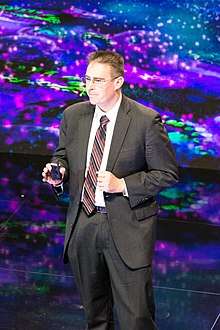Rob Knight (biologist)
Rob Knight (born 1976 in Dunedin, New Zealand)[1] is a professor at the University of California, San Diego and the co-founder of the American Gut Project. He is also a co-founder of the Earth Microbiome Project, and his lab's research involves the development of laboratory and computational techniques to characterize the microbiomes of humans, animals, and the environment.

Knight completed a BSc in biochemistry at the University of Otago and a PhD in Ecology and Evolutionary Biology at Princeton University in 2001,[2] where his thesis was "The Origin and Evolution of the Genetic Code."[3][4] Until 2014, he was a professor at the University of Colorado – Boulder.[5]
He did an IAmA on Reddit[6] and co-taught an online microbiome course on Coursera[7]. He gave a TED Talk in 2014 on the role microbes play on our health.[8][9] Later this idea was expanded into the book Follow Your Gut: The Enormous Impact of Tiny Microbes,[10][11] written with science journalist Brendan Buhler and published by Simon & Schuster.
In 2015, he received the Vilcek Prize for Creative Promise in Biomedical Science.[12]
Rob Knight has the prologue and a chapter dedicated to his spirit of exploration in a non-fiction, written for masses, science book ‘I Contain Multitudes’. The author Ed Yong highlights his visit to San Diego zoo with Knight where he swabs different animals to study the microbes collected. He explains the intriguing nature of the microorganisms and the way the affect development of life. The book was published in 2016.
American Gut Project
The American Gut Project, which claims to be the world's largest crowdfunded and crowdsourced scientific research project,[13] aims to characterize the human microbiome—the diverse communities of microorganisms that live in and on the human body.[14] Participants make a monetary contribution and submit personal microbiome samples, and receive information about their microbiome.[15]
References
- Gewin, Virginia (11 July 2012). "Microbes en masse: The sequencing machine". Nature.
35-year-old, Knight
- "Rob Knight profile". LinkedIn.
- Bland, Jeffrey (June 2016). "June 2016 Issue: Rob Knight". Retrieved 24 November 2018.
- Gibb, John (April 2009). "Prestigious award delights scientist". The Otago Daily Times. Retrieved 13 February 2016.
- Robbins, Gary (11 January 2015). "UCSD hires star biologist Rob Knight". The San Diego Union-Tribune.
- "I'm Professor Rob Knight. Let's talk about the lessons we can learn from poop...I mean, the millions of marvelous microscopic creatures inhabiting your gut". reddit.
- "Gut Check: Exploring Your Microbiome". Coursera.
- "Rob Knight: How our microbes make us who we are". TED. Retrieved 26 July 2016.
- "Colorado biochemist Rob Knight on TED: Microbes make us who we are". Genetic Literacy Project. Retrieved 26 July 2016.
- "TED Book: Follow Your Gut". TED. Retrieved 26 July 2016.
- "Ideas worth spreading about microbes: review of "Follow Your Gut" by Rob Knight". Gut Microbiota News Watch. Retrieved 26 July 2016.
- "CSE Faculty Affiliate Honored with Vilcek Prize | Computer Science and Engineering". www.cse.ucsd.edu. Retrieved 11 November 2015.
- "About Knight Lab". American Gut. 1 November 2015. Retrieved 28 September 2017.
- "FAQs". American Gut. 1 November 2015. Retrieved 19 September 2017.
- "We Are Citizen Science". American Gut. 1 November 2015. Retrieved 19 September 2017.
External links
- UC San Diego faculty: Rob Knight
- Knight Lab at UC San Diego
- Knight Lab at University of Colorado
- Rob Knight at TED
